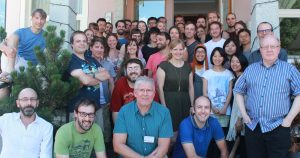July 2016 saw the fourth instalment of the biennial Summer School on ‘Computational and Mathematical Modeling of Cognition’, and for two weeks the Italian town of Dobbiaco became the temporary home for 35 students and early career researchers from around the world. Being one of the lucky ones to get admitted to the summer school, I went to Italy equipped with data and a project in mind. Here is a summary of the trip:
The overarching goal: Learn and write as much code as you can, feel stupid at least once every 10 minutes, have a few big ‘aha’ moments that will change your thinking. The schedule: 9am to 6pm for classes, 6pm to falling asleep on your laptop for project time. Repeat daily for 2 weeks, Sunday off (more on that later). The tasks to be accomplished by all students: At the start of the summer school, we all participated in a poster session and gave a three minute elevator pitch to communicate what topics and problems we usually work on, and also to present the mini-project each of us wanted to complete during the summer school. Each of us was assigned a supervisor, whose role it was to guide and help us with our project. On the last day, each of us gave a talk detailing our project, progress and future steps. But the main task really was to be active, to ask questions and to make sure you’re aboard the cognitive modelling bus (it’s fast). The structure: A great mix of concept-driven lectures, methodological seminars, and hands-on programming (aka play time). Most exercises involved reading, writing or modifying R code. That the summer school was heavy on R came with many advantages, such as learning about people’s favourite code snippets, witnessing a sparring match between apply functions in one corner and loops in the other, and asking yourself why you had never worked with the source command before (a must). On the down side, having R become your constant companion also resulted in unanticipated, rather undesired side effects: dreaming about being trapped inside a function and not getting out of the curly bracket … less fun than you might think. The instructors: A bunch of super smart, friendly, patient and helpful individuals with big names and great ideas (in no particular order: Stephan Lewandowsky, Simon Farrell, Jörg Rieskamp, Klaus Oberauer, Amy Criss, Casimir Ludwig, Gordon Brown, Bob French, Joachim Vandekerckhove, Christopher Donkin). The keynote speaker: Richard Shiffrin! Non-academic activities: Some of us decided to spend the Sunday (our one day off), hiking in the Dolomites and around the Tre Cime di Lavaredo. Unbeknownst to many, the route entailed a 15km, 7-hour hike up and down the mountainside, resulting in many burnt scalps, faces and sore legs. The verdict: An absolutely brilliant experience, a must for everyone interested in extending their methods toolbox and going beyond black box paradigms and performance measures. Never mind the sore legs and peeling skin, the hike was one of my personal highlights, with breath-taking views and pictures to boot. Lesson learnt: No source code? No clue? No Wi-Fi? No hiking boots or sun cream? Keep calm and find alternatives!
A big thank you to all the instructors and Casimir Ludwig, my supervisor for the summer school project, for an enlightening, interesting, hands-on, and in parts hilarious two weeks that have definitely opened new research avenues for all of us attendees.

Be the first to leave a comment. Don’t be shy.